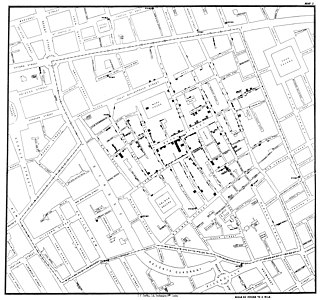Related Research Articles

Human geography or anthropogeography is the branch of geography that studies spatial relationships between human communities, cultures, economies, and their interactions with the environment, examples of which include urban sprawl and urban redevelopment. It analyzes spatial interdependencies between social interactions and the environment through qualitative and quantitative methods.

Social science is one of the branches of science, devoted to the study of societies and the relationships among individuals within those societies. The term was formerly used to refer to the field of sociology, the original "science of society", established in the 19th century. In addition to sociology, it now encompasses a wide array of academic disciplines, including anthropology, archaeology, economics, human geography, linguistics, management science, communication science and political science.

Integrated geography is where the branches of human geography and physical geography overlap to describes and explain the spatial aspects of interactions between human individuals or societies and their natural environment, these interactions being called coupled human–environment system.

Economic geography is the subfield of human geography which studies economic activity and factors affecting it. It can also be considered a subfield or method in economics. There are four branches of economic geography.
Cultural ecology is the study of human adaptations to social and physical environments. Human adaptation refers to both biological and cultural processes that enable a population to survive and reproduce within a given or changing environment. This may be carried out diachronically, or synchronically. The central argument is that the natural environment, in small scale or subsistence societies dependent in part upon it, is a major contributor to social organization and other human institutions. In the academic realm, when combined with study of political economy, the study of economies as polities, it becomes political ecology, another academic subfield. It also helps interrogate historical events like the Easter Island Syndrome.
Feminist geography is a sub-discipline of human geography that applies the theories, methods, and critiques of feminism to the study of the human environment, society, and geographical space. Feminist geography emerged in the 1970s, when members of the women's movement called on academia to include women as both producers and subjects of academic work. Feminist geographers aim to incorporate positions of race, class, ability, and sexuality into the study of geography. The discipline has been subject to several controversies.

David W. Harvey is a British Marxist economic geographer, podcaster, and Distinguished Professor of anthropology and geography at the Graduate Center of the City University of New York (CUNY). He received his PhD in geography from the University of Cambridge in 1961. Harvey has authored many books and essays that have been prominent in the development of modern geography as a discipline. He is a proponent of the idea of the right to the city.
Behavioral geography is an approach to human geography that examines human behavior by separating it into different parts. In addition, behavioral geography is an ideology/approach in human geography that makes use of the methods and assumptions of behaviorism to determine the cognitive processes involved in an individual's perception of or response and reaction to their environment. Behavioral geographers focus on the cognitive processes underlying spatial reasoning, decision making, and behavior.

Critical geography is theoretically informed geographical scholarship that promotes social justice, liberation, and leftist politics. Critical geography is also used as an umbrella term for Marxist, feminist, postmodern, poststructural, queer, left-wing, and activist geography.

Edward William Soja was an urbanist, a postmodern political geographer and urban theorist. He worked on socio-spatial dialectic and spatial justice.
Feminist political ecology is a feminist perspective on political ecology, drawing on theories from Marxism, post-structuralism, feminist geography, ecofeminism and cultural ecology. Feminist political ecology examines the place of intersectional social relations in the political ecological landscape, exploring them as a factor in ecological and political relations. Specific areas in which feminist political ecology is focused are development, landscape, resource use, agrarian reconstruction and rural-urban transformation. Feminist political ecologists suggest gender is a crucial variable – in relation to class, race and other relevant dimensions of political ecological life – in constituting access to, control over, and knowledge of natural resources.
Allan Richard Pred was an internationally known American geographer and professor at the University of California at Berkeley He wrote more than 20 books and monographs, translated into seven languages, and over 70 articles and book chapters.
Ecogovernmentality, is the application of Foucault's concepts of biopower and governmentality to the analysis of the regulation of social interactions with the natural world. The concept of Ecogovernmentality expands on Foucault's genealogical examination of the state to include ecological rationalities and technologies of government. Begun in the mid-1990s by a small body of theorists the literature on ecogovernmentality grew as a response to the perceived lack of Foucauldian analysis of environmentalism and in environmental studies.
Noel Castree FAcSS is a British geographer whose research has focused on capitalism-environment relationships and, more recently, on the role that various experts play in discourses about global environmental change. He is currently the editor-in-chief of the peer-reviewed journal Progress in Human Geography.

The sociology of space is a sub-discipline of sociology that mostly borrows from theories developed within the discipline of geography, including the sub fields of human geography, economic geography, and feminist geography. The "sociology" of space examines the social and material constitution of spaces. It is concerned with understanding the social practices, institutional forces, and material complexity of how humans and spaces interact. The sociology of space is an inter-disciplinary area of study, drawing on various theoretical traditions including Marxism, postcolonialism, and Science and Technology Studies, and overlaps and encompasses theorists with various academic disciplines such as geography and architecture. Edward T. Hall developed the study of Proxemics which concentrates on the empirical analysis of space in psychology.
Dame Sarah Jane Whatmore is a British geographer. She is a professor of environment and public policy at Oxford University. She is a professorial fellow at Keble College, moving from Linacre College in 2012. She was associate head (research) of the Social Sciences Division of the university from 2014 to 2016, and became pro-vice chancellor (education) of Oxford in January 2017. From 2018 she has been head of the Social Sciences Division.

Marxist sociology refers to the application of Marxist perspective within the study of sociology. Marxism itself can be recognized as both a political philosophy and a sociological method, insofar as it attempts to remain scientific, systematic, and objective rather than purely normative and prescriptive. Hence, Marxist sociology is "a form of conflict theory associated with…Marxism's objective of developing a positive (empirical) science of capitalist society as part of the mobilization of a revolutionary working class."
The commodification of nature is an area of research within critical environmental studies that is concerned with the ways in which natural entities and processes are made exchangeable through the market, and the implications thereof.

A critical theory is any approach to humanities and social philosophy that focuses on society and culture to attempt to reveal, critique, and challenge power structures. With roots in sociology and literary criticism, it argues that social problems stem more from social structures and cultural assumptions rather than from individuals. Some hold it to be an ideology, others argue that ideology is the principal obstacle to human liberation. Critical theory finds applications in various fields of study, including psychoanalysis, sociology, history, communication theory, philosophy and feminist theory.

James "Jim" D. Proctor is an American geographer, the editor and author of numerous books and articles, and professor of environmental studies at Lewis and Clark College in Portland, Oregon (2005–). Before coming to Lewis and Clark College, he taught in the department of geography at the University of California, Santa Barbara (1992–2005). In 2002, Proctor founded the Alder Creek Community Forest educational nonprofit in his birthplace of Canyonville, Oregon. Proctor is also a senior fellow at the Breakthrough Institute.